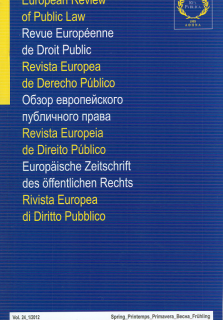
"THE DIALOGUE OF THE JUDGES"
NATIONAL COURTS AND EUROPEAN COURTS
BULGARIA
RUMEN STEFANOV
Professor at the Department of Political Sciences, New Bulgarian University
Bulgarian judicial institutions actively participate in the dialogue with the European judges in almost all possible forms this cooperation could take shape. Due to the short period since when the Republic of Bulgaria became an EU member, it is not possible to explicitly assess the extent to which these relations fit the requirements of a complete partnership. Some instruments for the exchange of experience and practices are presented scarcely, even neglected. Part of the magistrates, especially the older generations, are very skeptical and usually avoid to recur to assis¬tance, official or unofficial, of their European counterparts. A considerable part of the specialists in the field do not have sufficient experience and knowledge to address directly EU judicial institutions in order to increase their qualification and to improve their performance in the field. Even internal legal regulations contain norms which impede the recurrence to such tools like "preliminary rulings". The courts' adjudications do not consider such options more favorably either. The actual Bulgarian authorities take measures to overcome the deficiencies. Their efforts met the understanding of EU and other Member States' judicial and scholar structures. But there is still room for the development of relations: practical training of national judges, magistrates, specialists, experts and even students in both EU and other countries' courts; joint researches on the shortcomings in European legislation enforcement; direct surveillance on the trial procedure, when a court decision taken in one Member State should be enforced on the territory of another country etc. The Lisbon Treaty gives way to new opportunities, but it will take time to implement them completely.
Les institutions judiciaires bulgares participent activement au dialogue avec les juges européens sous presque toutes les formes possibles pour cette coopération. Vu le caractère récent de l'adhésion de la Bulgarie à l'Union européenne, il n'est pas possible d'apprécier formellement dans quelle mesure ces relations remplissent les conditions d'un partenariat complet. Certains instruments pour l'échange d'expérience et de pratiques sont à peine présentés, voire négligés. Une partie des magistrats, notamment les générations les plus anciennes, sont très sceptiques et évitent d'habitude de recourir à l'assistance, officielle ou non, de leurs homologues européens. Un nombre considérable de spécialistes du domaine n'ont pas l'expérience et les connaissances suffisantes pour s'adresser directement aux institutions judiciaires européennes afin d'accroître leur qualification et améliorer leurs performances. Il existe même des règles juridiques internes qui contiennent des normes entravant le recours à des outils tels que les "procédures préjudicielles". Les décisions des tribunaux sur la question ne considèrent pas plus favorablement non plus de telles options. Les autorités bulgares actuelles prennent des mesures pour pallier les carences. Leurs efforts ont été compris des structures judiciaires et spécialisées de l'Union européenne et des autres Etats membres. Mais il y a encore des possibilités de développement des relations: formation pratique de juges nationaux, magistrats, spécialistes, experts et même étudiants auprès des tribunaux européens et d'autres pays; recherches communes sur les points faibles de la mise en œuvre de la législation européenne; surveillance directe de la procédure judiciaire, quand une décision de justice rendue dans un Etat membre est susceptible d'être exécutée sur le territoire d'un autre pays, etc. Le traité de Lisbonne laisse place à de nouvelles possibilités, mais leur mise en œuvre pratique demandera du temps.





















